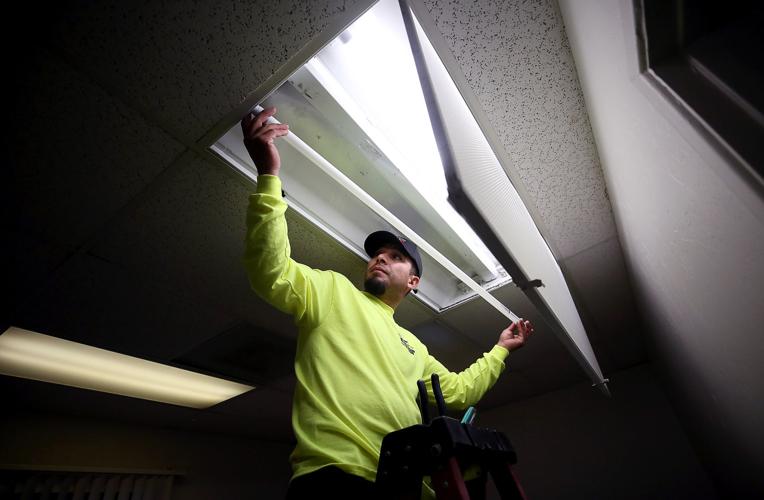Editor's note: With our coronavirus coverage, the Star is not trying to alarm the public but to provide up-to-date information so you can make educated decisions about your health. Because of this, we’ve made all coverage related to COVID-19 free. Help us continue this important work by subscribing to the Star. Click here to see the latest coronavirus updates in Southern Arizona.
PHOENIX — Gov. Doug Ducey has prepared a list of “essential services” in case he decides to order everyone who doesn’t fit into that category to stay home due to COVID-19.
He said Monday that he would not “at this time” follow the lead of counterparts in other states who have implemented “shelter-in-place” directives. He said the health experts he has talked to don’t believe that’s necessary.
“I’m working with guidance from CDC (Centers for Disease Control and Prevention) and the Department of Health Services,” Ducey said. “That’s been guiding Arizona’s direction.”
He added, “As I travel around the state it’s obvious that citizens around the state already are staying at home and acting responsibly. There’s empty streets and empty sidewalks and traffic-free highways.”
Ducey acknowledged that, in preparing the essential services list, he is setting the stage for who will be governed by such an order should he decide it becomes necessary here.
“We are watching what’s happening around the country,” Ducey said, describing the list as a “proactive and administrative step.”
He said it will let individuals and their employers know what to expect.
“It’s to provide clarity,” he said. “It’s so that people in these situations can plan ahead. We’re going to hope for the best but we’re going to prepare for eventual escalation of this.”
Ducey said the situation will get worse before it gets better, mentioning the deaths in Arizona so far.
“It’s a sobering indication of what we will likely continue to face,” he said. “The sad reality is, just like the rest of the country, we expect more deaths. And as we work to increase testing capacity, we expect more confirmed cases.”
State Health Director Cara Christ said her department also is preparing for what happens next.
One particular issue, she said, is the state now has 16,905 licensed hospital beds and 1,532 intensive care beds.
“The estimated need is rapidly evolving as we gather new data, with a potential surge of COVID-19 patients above and beyond our current capacity of beds,” Christ said.
She said some of that could be taken care of by having hospitals use triage tents outside of emergency rooms and by converting recovery rooms and other unused portions of buildings.
Christ also said the state is looking at reopening closed facilities and converting ambulatory care centers — essentially out-patient facilities — into hospitals.
There’s also a proposal to use the Arizona Coliseum in Phoenix “to provide step-down or recovery care to those who are ready to leave the hospital but unable to go home.”
Christ said she is working with federal agencies to secure three field hospitals, two for Phoenix and one for Tucson.
The governor separately ordered new procedures to require hospitals and private laboratories to provide more information on the testing they are doing.
Those operations already report when there is a positive test. But what is not known is how many tests they have performed.
The same order requires hospitals to file daily reports on staff resources and availability of equipment like ventilators, personal protective equipment and medical supplies.
Ducey also said he has no plans ready to unveil on what he intends to do about the economic havoc that COVID-19 has placed on individuals and companies.
“We care about the people that are affected and living paycheck to paycheck,” he said.
He said there is a 14-page “economic protection plan” being worked out, promising details in “the very near future.” But he said that’s not where his attention is right now.
“The priority and focus first and foremost has been public health,” Ducey said.
Ducey noted that the $11.8 billion contingency spending plan for the coming year just approved by the Legislature provides $50 million for him to use at his discretion for economic relief.
“It’s our intention that we will be stretching and strengthening the safety net of the state,” he said, adding he is “hopeful” that Congress will enact a plan.
Some of the economic issues remain firmly within control of the states.
Arizona limits weekly jobless benefits to $240 a week, a figure that has not been altered since 2004. Only Mississippi has a lower cap.
Ducey provided no answer to the question of whether he will seek to seek to increase that figure, saying only he wants to focus on “the most vulnerable.”
Photos for March 20: Tucson gets by during coronavirus pandemic
Tucson-area, Coronavirus (COVID-19)
Updated
Marina Cornelius, owner of Floor Polish Dance + Fitness, teaches her Cardio Party-o class via Periscope to her students on March 20, 2020. Cornelius says this is the first time she's trying to livestream classes and is learning as she goes.
Tucson-area, Coronavirus (COVID-19)
Updated
Marina Cornelius, owner of Floor Polish Dance + Fitness, talks to her students via Periscope before teaching her Cardio Party-O class on March 20, 2020. Cornelius says this is the first time she's trying to livestream classes and is learning as she goes.
Tucson, coronavirus pandemic
Updated
A group of friends from St. Louis enjoy their lunch along Sentinel Peak after a 40-mile bike ride on March 20, 2020. The cycling friends planned their trip to Tucson months ago and decided to keep their vacation plans. They arrived on March 1st and leave this weekend. For the past three weeks they've been cycling through Saguaro National Park, up Mt. Lemmon, Kitt Peak and The Loop. On Friday they got takeout from Seis Kitchen and their bicycle touring company set up tables and chairs for them. They felt they self-quaratined with just the six of them during the coronavirus disease (COVID-19) outbreak.
Tucson, coronavirus pandemic
Updated
Ricardo and Vera Escalante say they're addicted to Pat's Chili Dogs and needed to get their fix on March 20, 2020. The pair got their order to go since bars and restaurants are barred from having customers in their facilities due to the coronavirus disease (COVID-19) and decided to enjoy their lunch at the top of Sentinel Peak.
Tucson, coronavirus pandemic
Updated
Khristina Hernandez puts on disposable gloves before cleaning a room at Hotel McCoy located at 720 W Silverlake Road, on March 19, 2020.
Tucson, coronavirus pandemic
Updated
Lacy Tritz prepares an order at the Downtown Dispensary located at 221 E 6th Street, on March 20, 2020. Employees are now required to wear masks at the dispensary and customers will now order at the front desk or online.
Tucson, coronavirus pandemic
Updated
A line grows outside the doors to Trader Joe's at Swan and Grant as an employee limits customers entering the store to one-out one-in, March 20, 2020, Tucson, Ariz.
Tucson, coronavirus pandemic
Updated
Banner UMC’s drive up system is for emergency room triage for a variety of illnesses and is not for random testing for COVID-19. It has been put in place to keep crowds from the ER and protect the health of patients and staff.
Tucson, coronavirus pandemic
Updated
Banner UMC’s drive up system is for emergency room triage for a variety of illnesses and is not for random testing for COVID-19. It has been put in place to keep crowds from the ER and protect the health of patients and staff.
Tucson, coronavirus pandemic
Updated
Banner UMC’s drive up system is for emergency room triage for a variety of illnesses and is not for random testing for COVID-19. It has been put in place to keep crowds from the ER and protect the health of patients and staff.
Tucson, coronavirus pandemic
Updated
Cazandra Zaragoza, center, reacts to finding out her placement for her medical residency during Match Day on March 20, 2020. Due to the coronavirus disease (COVID-19), the annual Match Day event at the University of Arizona was canceled. Students received an email informing them of their placement. Zaragoza was surrounded by friends and family including her husband, Joseph Llanes, right, and her 2 sons, Ezra Zaragoza-Llanes, 7, far left and Eleazar, 10, when she found out her placement is family medicine in San Francisco. Zaragoza is one of the recipients of the Primary Care Physicians Scholarship. The scholarship paid for her last year of medical school. As part of the scholarship, Zaragoza will return to Arizona and work in an underserved or rural area.
Tucson, coronavirus pandemic
Updated
Wade Biehl, manager at Five Points Market & Restaurant, 756 S. Stone Ave., brings a takeout order to a customer outside of the restaurant on March 20, 2020. Due to the coronavirus disease (COVID-19), bars and restaurants have been ordered to only offer takeout options to customers. Biehl said customers are not allowed inside the restaurant and can only call or text in their orders to limit contact with staff.
Tucson, coronavirus pandemic
Updated
Julie Swartzentruber, a server, tells a customer over the phone their dessert options at Five Points Market & Restaurant, 756 S. Stone Ave., on March 20, 2020. Due to the coronavirus disease (COVID-19), bars and restaurants have been ordered to only offer takeout options to customers. Customers are not allowed inside the restaurant and can only call or text in their orders to limit contact with staff.
Tucson, coronavirus pandemic
Updated
A car turns onto a nearly empty 4th Avenue, on March 20, 2020.
Tucson, coronavirus pandemic
Updated
Sarah Lang views responses from her fifth-grade students on Google classroom at Centennial Elementary School in the Flowing Wells School District, Tucson, on March 20, 2020.
Tucson, coronavirus pandemic
Updated
Sarah Lang, teacher at Centennial Elementary School in the Flowing Wells School District, Tucson, talks to parents picking up breakfast for their kids on March 20, 2020.




